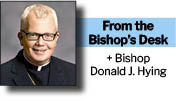
Ponder with me the wonder of words and language.
Through the gift of speech, we can verbally articulate and share with others the thoughts in our minds and the feelings in our hearts.
Through writing, we can put down on paper what lies deepest within us. Think of the great works of literature, history, biography, and science.
Language humanizes us and connects us with others; without it, life would be unimaginable.
Remember Helen Keller? Going both blind and deaf at 19 months because of an illness, Helen was trapped in a dark, wordless world until Anne Sullivan, her tutor, taught her sign language and enabled her to communicate, and even to speak.
The significance of words
In light of the remarkable gift of words, how significant that John calls the Son of God, the Second Person of the Blessed Trinity, the Word.
Eternally spoken by the Father, the Word is present at the creation of the world and becomes flesh in the Person of Jesus Christ.
Through His preaching, teaching, and parables, all through spoken words, the Lord reveals the inner life of God and the nature of the Kingdom of Heaven.
Through the inspired Word of God in the Bible, the Lord speaks to us for all time.
Meditating and praying over the Scriptures reveals this Divine Word to us, who is Christ Himself.
What a gift from God is the ability to pray, preach, teach, and evangelize, utilizing our words to bring others to the Lord, even as we praise, thank, petition, and seek forgiveness from the Word.
Our spoken and written words should only magnify truth, extend goodness, and manifest love.
We all know the power of words. When another person encourages, praises, or thanks us, we feel great!
When we hear words of cruelty, sarcasm, or bitterness, we can be deeply hurt.
Language as a positive tool
God commands us to respect the integrity and purpose of language, as He has given it to us.
In his New Testament letter, St. James says, “The tongue is a small member and yet has great pretensions.
The tongue is also a fire. It exists among our members as a world of malice, defiling the whole body and setting the entire course of our lives on fire . . . With it, we bless the Lord and Father, and with it we curse human beings who are made in the likeness of God. From the same mouth come blessing and cursing. This need not be so, my brothers.” (James 3: 5-10)
The Third Commandment forbids us to take the name of the Lord God in vain.
Besides misusing God’s name in our speech, this commandment also condemns blasphemy, cursing, swearing, gossip, and calumny.
Given the high level of all these sins in our society, how important it becomes for us to witness to others the sacredness of speech by only using words that will truly honor God and build up others.
Much of social media is foul language, malicious gossip, and angry diatribes.
I am often struck by the bad language of people around me in conversation, when I am waiting at the airport or in a restaurant, even when they see my collar.
As Catholic disciples, the Lord calls us to use our human senses and gifts to glorify Him and to serve our neighbor.
In the sacraments, God communicates His life and grace to us through sight, sound, feeling, and even taste in the Eucharist and smell when incense arises to God.
A good spiritual practice is to regularly thank God for our senses and abilities, and to consecrate them anew to His sacred purpose, so that we misuse them less and less, especially the gift of speech.
I particularly want to comment here on the sin of gossip.
As both a priest and a bishop, I am always amazed by the rumors, gossip, and calumny that some “good” Catholics can be capable of.
Malicious interpretations of decisions or actions, outright lies about others within the Church, and the poison of anonymous letters stand out as egregious examples.
When I open a letter, I immediately look to see if there is a name and address or phone number at the bottom. If there is not, I toss it without reading it at all.
If someone does not have the courtesy and integrity to put their name to their thoughts and opinions, then those ideas will not even enter my mind.
How refreshing when we have the magnanimity of soul to give someone the benefit of the doubt, to ascribe good intentions to a decision rather than bad, to admit that we do not have all the facts, to refrain from judgment and malice, to pray for the people whom we are tempted to gossip about, instead of criticizing them behind their backs.
In these simple ways, we can live out the full meaning of the Second Commandment and witness to the world what Christian charity and courtesy truly look like.

